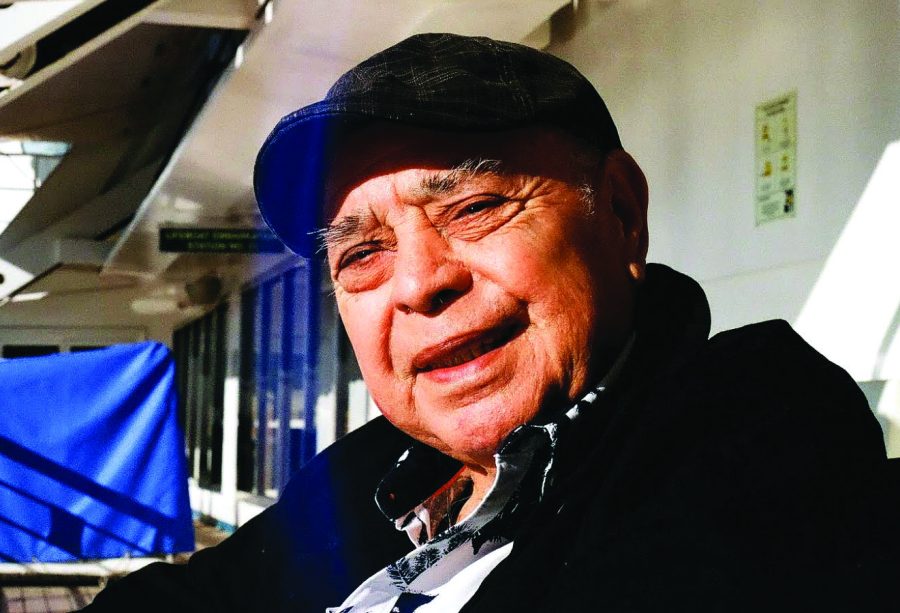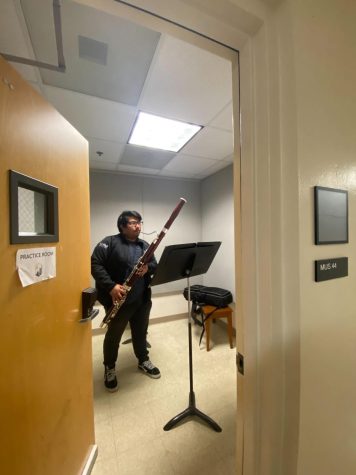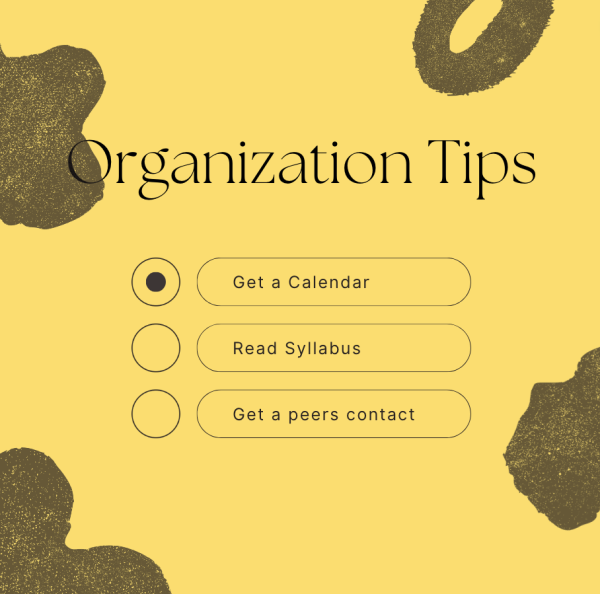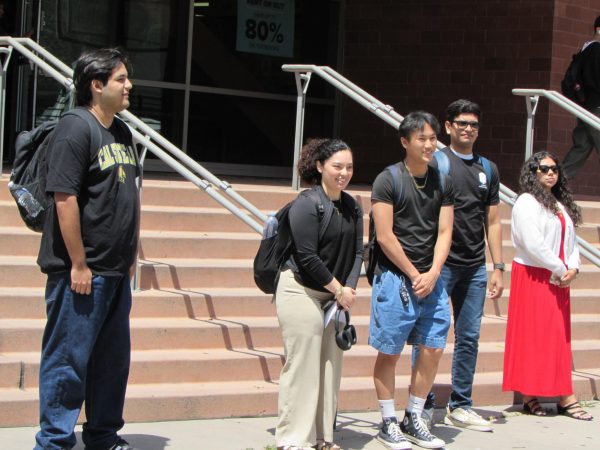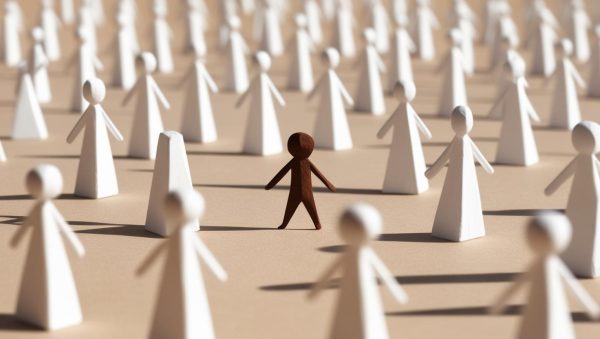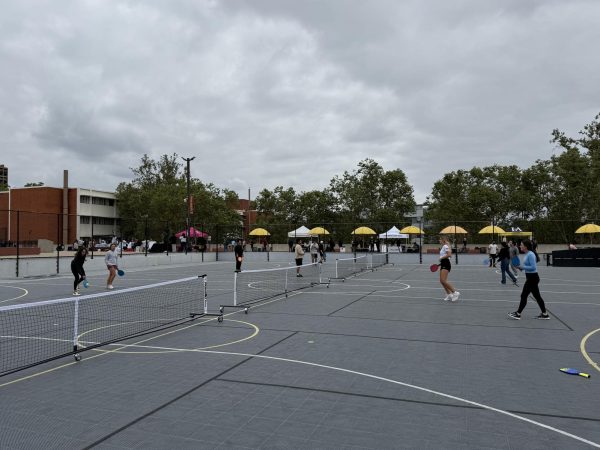Death, depression and devastating news: How my professor became my saving grace
Hugo Alvarez poses for a film camera portrait. Photo by Victoria Ivie.
Too many deadlines, finals, and fast-approaching graduation. That’s what probably has most students stressed and overwhelmed at this point in the semester. For me, death, crippling mental health issues, and a life-changing diagnosis has been my undoing the whole fall semester.
Loss
When the semester began, a childhood friend of mine passed away of cancer. Things had been bad with him for a minute, but the loss was extremely heartbreaking. While we had drifted apart after high school, our families still interacted often and hung out together. This tragic death brought up a lot of unresolved feelings for me from when my dad passed away from cancer in 2016. I was diagnosed with depression back then, and I found myself going through the same cycle of unanswered “what-ifs” and “whys” when my childhood friend passed. Why was this the end of his life at 25? He’ll never get to see his niece and nephew grow up. How is the family going to handle this loss?
For my mom and I, we have struggled with the weight of our grief for years. And still, the smallest things can trigger our feelings of overwhelming loss. The loss of my childhood friend impacted me a lot more than I expected.
In recent years, I’ve been on the antidepressant Zoloft. While it has helped stabilize my depression and moods, it, just like any medicine, is never a cure. With that, I’ve still had periods of intense depression that take a few days, up to a week, to “get back to normal.” Sometimes my “normal” is being glad I can get out of bed in the morning.
With this loss, I don’t think I’ve gotten back to feeling okay until the first week of November. I have been extremely depressed, anxious and struggling to cope with things. Usually, I let this completely debilitate me for a few days, when I’ve felt like this during a school semester. Because I felt this for more than a few weeks, I realized I was really going to need help.
Getting help
I am never usually one to reach out to professors, or anyone for that matter, for help. I have a really hard time being vulnerable and an even harder time discussing my mental health. Even still, I knew I would need to stay on track this semester if I didn’t want to jeopardize my Spring 2023 graduation.
One of my professors I reached out to was TVFM Professor April Brown, with whom I have three journalism classes this semester.
Brown is unique in that she does weekly graded “student well-being check-in” surveys asking questions such as how students’ stress levels are currently, how they feel stress levels are impacting their work and what does and doesn’t work in the class. She is the only professor I have seen do this while I’ve been at Cal State LA.
She said this is a tactic she started using after the university recommended it for teaching virtually when the COVID pandemic first started.
“Oftentimes, students will put off their cameras. I was talking to basically a block of names and a couple of photographs,” Brown said. “I had no way of really visually telling by the looks on their faces or anything else how they were doing. It was an effective tool. Then I thought, even if I see students, often it doesn’t necessarily mean I’ll be able to tell if they’re going through something serious that could impact their lives and, most importantly, their schoolwork. So I just kept it going.”
I met with Brown during her virtual office hours, and she was extremely kind. I felt a bit embarrassed, crying within a minute of talking with her, but she was nothing but understanding. While I’ve taken classes with Brown before, I honestly didn’t think anyone would be willing to help me, much less someone I considered to be a strict professor.
As a professor, I consider Brown to be strict and exact with what she wants in assignments, both of which make her effective. When I needed help the most this semester, I was met with extreme compassion and accommodations from Brown, which has been a vital resource that has kept me going.
She helped me talk through some assignments, and use one of my “free passes” that “allow you to re-do one of the weekly assignments you didn’t turn in or improve a score from a previous assignment,” as her syllabus says. We even discussed upcoming assignments and whether I could do them in time or needed an extension. To be able to reflect on how I am doing and be honest about what I think I can and can’t handle with my schoolwork. It has even allowed me to not get caught up in where I messed up but instead focus on how I can improve for the next assignment.
“I’m very clear about no late work because, in journalism, deadlines are really crucial, and I treat my students as if they’re in a newsroom,” Brown said. “If for some reason, you can’t finish your work and you give me a sense that there’s something serious going on in your life that’s preventing you from doing it, I will work with you on deadlines. If students aren’t in a good place, they’re not going to be able to do good work.”
I found this to be true many times throughout my college career.
The “depression habit spiral,” as Students Against Depression’s website called it, is a cycle of “the more things get put off, the more overwhelming they seem. Procrastination is particularly linked to the depressed thinking habits of perfectionism, self-bullying and all-or-nothing thinking.” Students Against Depression is a website by students for students.
I struggle with this a lot, where I don’t have the energy to do things and then get extremely overwhelmed and make myself feel like a bad person for not doing those things, which shockingly does not help me with getting into a better head space.
Diagnosis
In the midst of all this, my 88-year-old grandfather was having some concerning health issues. My mom and I are his primary caregivers and take care of his dialysis travel, medications, and the rare doctor visit, as well as everyday things like meals, laundry and grocery shopping.
Two months ago, he started falling. He ended up falling four times within two months, one of which resulted in him being taken away by ambulance. Luckily, no serious injuries resulted from any of the falls but they were extremely stressful since sometimes my grandpa would be at home alone while my mom and I are at school and work. I worried he’d fall and seriously injure himself when no one was around. I also worried about why he was suddenly falling so much and if it meant something worse was going on. I would fixate on what could be wrong and it caused me to have a lot of anxiety.
“Falls are the leading cause of injury-related visits to emergency departments in the United States and the primary etiology of accidental deaths in persons over the age of 65 years,” according to the American Academy of Family Physicians website. “The mortality rate for falls increases dramatically with age in both sexes and in all racial and ethnic groups, with falls accounting for 70% of accidental deaths in persons 75 years of age and older.”
Falls can also occur because of underlying health issues.
For my grandpa, this turned out to be true. My grandpa was diagnosed with Alzheimer’s after failing a moca test for dementia and having a CT scan. Even though I knew this was most likely going to be his diagnosis, it has been an extreme struggle for our family to handle.
“Students are dealing with a lot,” Brown said. “Jobs, family matters, personal issues. If you’re not able to do the work because of a physical or family or mental reason, I want to make sure that those things are taken care of first and foremost. I feel like as a person, my job is to make sure that I do what I can to help my students be in a place where they can learn the best and do their best work. I’ve had times where things were really tough, and I was only able to get through those with caring and compassion from other people. So I just try to teach that way.”
Since getting his diagnosis, I have struggled a lot to handle the amount of extra care my mom and I have to provide. It is really hard having to adjust life to be able to be more understanding and patient with my grandpa. It is a lot more work than either of us expected, especially when he moves around a lot slower and has more difficulty doing things like showering and getting around since his numerous falls.
The new normal
My mom and I have both been struggling the last few weeks but have recently gotten into a good system of having our schedule so someone is always home with grandpa. For her, that means working from home. For me, that means doing school virtually or asking my mom to work at home the days I have to go to campus. We’re extremely lucky we both have the option of working from home.
We have also started asking for help more. My uncle and cousin now help us with driving my grandpa to and from dialysis one of the three days he goes, every week. They also take him for a weekend so they can spend time with him and my mom and I get a break. This has helped so much. I finally feel like I’m catching my breath and am then able to give my best care to him and get back on top of my schoolwork. There is still a lot to figure out, but now I’ve become practiced in reaching out for help.
Advice and resources
If you are struggling, please reach out to someone, whether that be friends, professors or even psychological services. Cal State LA students can reach out to Counseling and Psychological Services at their website. If you are experiencing anxiety, call 800-854-7771 or go to the LA County Mental Health Resources website. If you are experiencing suicidal thoughts, dial 988 or visit the County of Los Angeles website.
“There are resources out there and people who want to help you, even if it seems like there aren’t,” Brown said. “When you’re in your darkest headspace or things are overwhelming, it can be impossible to see that. But just try to reach out to someone. I think in most cases, you’ll at least get someone to lend an ear if not to lend a hand.”
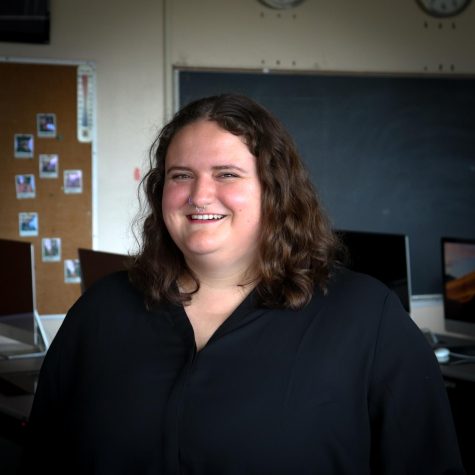
Victoria Ivie (she/they) is a fourth-year journalism major. She is the Editor-in-Chief of the University Times and writes with a focus of undercovered...

